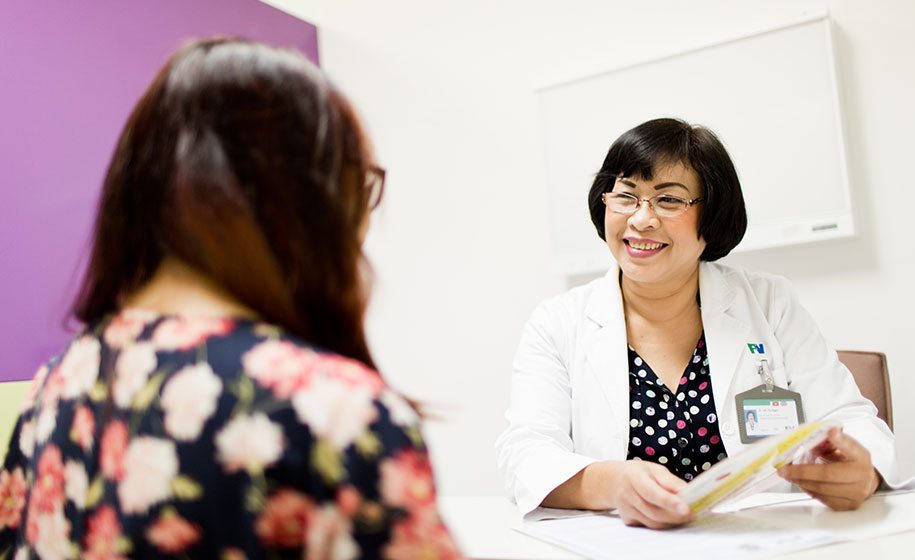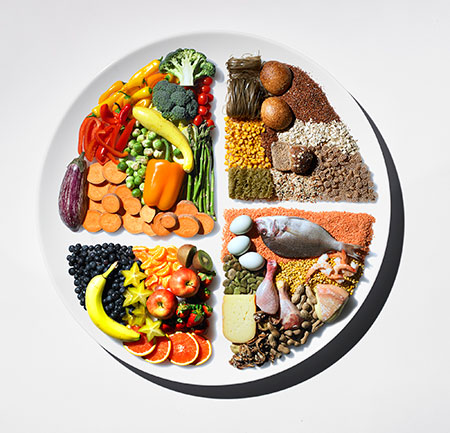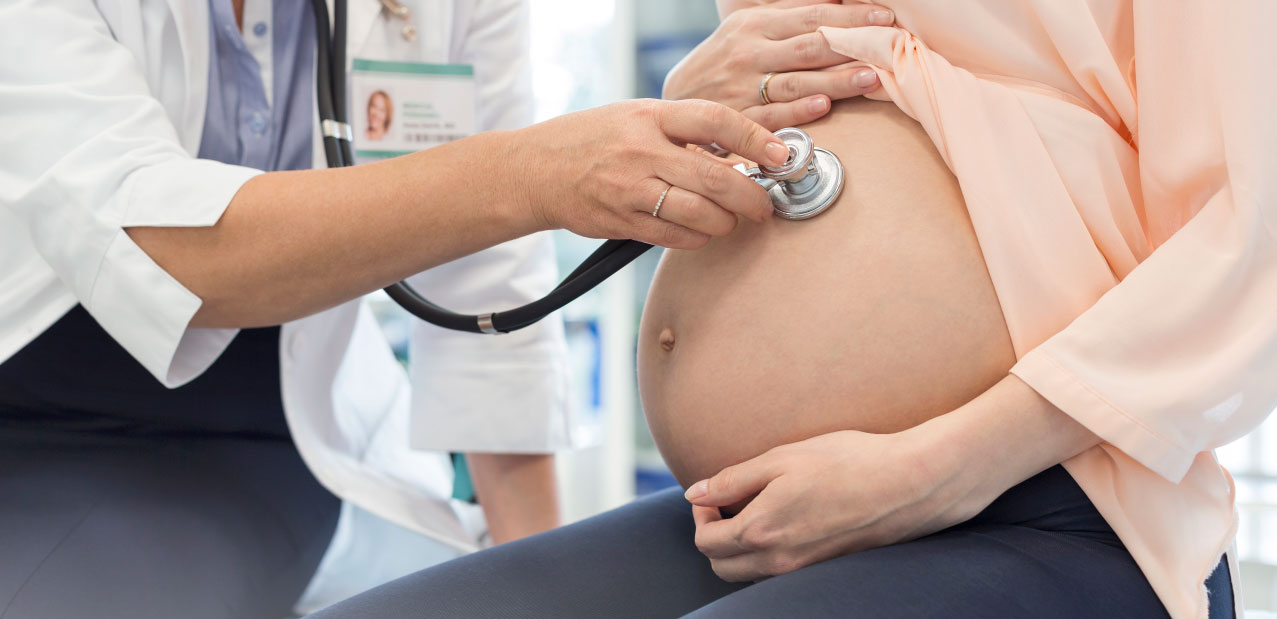I’M PREGNANT!
There are few experiences in life as powerful as finding out that you’re pregnant. It’s amazing to think that you have a new life growing inside you. From the moment you begin to feel changes in your body – or you know for sure that you’re pregnant – you may begin to feel protective and look forward to having the baby. You would also probably begin to think about arranging for your maternity care.
What you put in your body before falling pregnant, during your pregnancy and after the birth can affect your baby. Eating the right foods, knowing what food and drink to avoid, exercise regularly and quitting smoking and alcohol are all important if you are to increase your chances of a healthy pregnancy.
FREQUENTLY ASKED QUESTIONS
- Why is prenatal care important?
- When should I have prenatal screening for foetal anomaly?
- Do I need a special diet for two?
- Why is folate important?
- Why do I feel like swollen ankles, feet and fingers?
- Can I continue to smoke or drink alcohol?
- Should I breastfeed?
- What should I do about taking medications?
- Can I continue to exercise?
- Is getting enough rest important?
- Is it safe to have sex?
- Are there any workplace hazards?
- Can I travel whilst pregnant?
- What are some of the common discomforts of pregnancy?
- What are some common complications of pregnancy?
Why is prenatal care important?
Regular appointments with your obstetrician throughout your pregnancy are important to ensure the health of you and your baby. In addition to medical care, prenatal care includes education on pregnancy and childbirth, plus counselling and support. FV Hospital has devised a comprehensive Pregnancy Follow-up package to care for your health and that of your baby at every stage of your pregnancy.
The first visit is designed to determine your general health and give your obstetrician clues to the risk factors that might affect your pregnancy. It will typically be longer than future visits. The purpose of the initial visit is to:
- Determine your due date;
- Find out your health history;
- Explore the medical history of family members;
- Determine if you have any pregnancy risk factors based on your age, health, and/or personal and family history.

The schedule of your prenatal care visits will be explained to you by your obstetrician, generally it is recommended to have follow-up visits every 4 weeks until 36 weeks and then weekly. During each subsequent visit, you will have a chance to discuss any questions or concerns. Your blood pressure and weight gain will be checked. Your doctor will also examine your abdomen to ascertain the position and size of the baby. In the later weeks of pregnancy, your baby’s heartbeat will also be monitored.
The assessment also involves the following blood tests:
- A full blood count to exclude anaemia;
- Blood grouping and Indirect Antiglobulin Test (IAT) in the event a blood transfusion would be required;
- Syphilis screening;
- Rubella antibody screening to establish a history of exposure to this infection;
- Toxoplasma screening;
- HCV and hepatitis B screening;
- An HIV screening as the implications on your baby may be significant should these infections be present;
- Glucose tolerance test.
Please read our brochure “FV Hospital Pregnancy Follow-Up Package”.
When should I have prenatal screening for foetal anomaly?
The Combined Test must be performed between week 11 to week 13 and 6 days, counted from the first day of your last period. The Combined Test gives detection rates for Down syndrome of 85-90% and false positive rates of 5%. It includes:
- Ultrasound scanning to measure a specific region on the back of a baby’s neck. This is known as a Nuchal translucency (NT) screening test. When abnormalities are present, more fluid than usual tends to collect in this tissue;
- The Double Test which measure levels of Pregnancy-Associated Plasma Protein-A (PAPP-A) and a hormone known as human Chorionic Gonadotropin (βhCG) in the maternal blood.
If the Double Test has not been performed or not in time, the Triple Test must be done between week 14 and week 21 and 6 days. This test measures the level of human Chorionic Gonadotropin (βhCG), alpha-fetoprotein (AFP) and unconjugated estriol (uE3) in the maternal serum. Like the Combined Test it must be combined with the ultrasound Nuchal Translucency (NT) screening test.
FV Hospital offers also Non-Invasive Prenatal Screening (NIPS) for Down Syndrome and other abnormalities. During pregnancy, a very small amount of baby’s genetic material is transferred through the placenta into mother’s blood circulation. NIPS is a non-invasive method to screen for certain specific chromosomal abnormalities in the developing baby through testing of blood collected from the mother. A simple blood sample is collected from the mother and sent to the laboratory. The laboratory will then extract the baby’s DNA from that sample to screen for any abnormal chromosomes.
NIPS is currently the most sensitive and specific method in screening for the three common abnormalities affecting chromosomes 13, 18 and 21. It can be performed from the 10th week of gestation and all along the pregnancy.
Do I need a special diet for two?
You don’t need to “eat for two’ while you’re pregnant. You just need to have more of the nutrients your baby needs for their healthy development, and fewer foods that are high in salt, sugar and fat. These can be harmful both for you and your baby. In fact, most women do not need extra calories for the first trimester and only require approximately 200-300 extra calories per day during the second trimester and 300-400 extra calories per day during the third trimester.

However, because your blood sugar levels fluctuate more due to the extra demands on your body, it is important to eat regularly, including snacks between meals. During the second trimester, it is recommended to add one extra snack and during the third trimester, two extra snacks.
Total weight gain depends on your weight before pregnancy. Most women gain between 9 to 13 kg during pregnancy, although this can vary from woman to woman. Inadequate weight gain may not be safe for you and your baby so you should never try to diet during this period as you could be depriving the baby of vital nutrients.
Weight gain during pregnancy is normal and healthy, with the bulk of it concentrated in the second and third trimesters. The exact amount depends on your health and pre-pregnancy BMI and should be discussed with your obstetrician.
Healthy foods
The best thing to do throughout pregnancy is to eat a variety of healthy foods. It’s recommended that you eat a wide variety of fruits and vegetables of different types and colours every day. Expectant mothers should consume carbohydrates, protein and fats from good and healthy sources.
Your diet should also contain micronutrients which are key components necessary for growth and development. These include foods containing iron (e.g. green leafy vegetables, red meat, beans and pulses although additional iron supplements may also be given to you by your doctor); calcium (e.g. dairy produce, fish with edible bones like sardines and bread), Vitamin D (fatty fishes and sun exposure – 10-15 min/day) and folate (e.g. green beans, oranges, spinach, lentils, asparagus, chickpeas and broccoli). Eat salty food in moderation, as salt causes your body to retain water and could lead to an elevation of blood pressure.

Try to eat something from the following food groups daily:
- Fresh fruit and vegetables: 4 – 6 servings/day
- Pasta, potato, rice, whole grain bread and cereals: at least 1 serving at each meal and 4 servings/day
- Lean meat, poultry, fish, eggs, pulses and nuts: 2 – 3 servings/day
- Dairy products: 2 – 3 servings/day
- Fat: vegetable oils, fatty fishes (herring, salmon, mackerel – maximum 2 times per week due to exceed mercury content), oily nuts (almond, cashew, walnut).
It is also important to follow food safety during pregnancy such as:
- Avoid eating raw or undercooked meat, fish (including sushi) or egg, unpasteurised milk or juice, home-made mayonnaise and ice-cream, raw shellfish, and mould ripened cheese (blue cheeses);
- Clean your fridge regularly. Temperature must be between 0°C and 5°C. Separate raw and cooked foods;
- Avoid harmful substances such as unsolicited medications, drugs, cannabis, cigarettes, alcohol;
- Limit potentially harmful substances such as oily fish maximum 2 times per week (herring, salmon, mackerel), caffeine less than 200 mg/day (2 cups of coffee or 3 cups of tea), soy foods 1-2 servings per day (tofu, soy milk, soy-based desserts), artificial sweeteners (saccharin, aspartame).
Why is folate important?
Folate is a B vitamin crucial in the development of baby’s nervous system. It has been shown to reduce the chance of having a baby with a neural tube defect (a disability affecting the nervous system). Normally, the neural tube develops into the spinal cord and brain by 28 days after conception.
Folate is found in green beans, oranges, spinach, lentils, asparagus, chickpeas and broccoli, however it is easily destroyed during cooking and large servings are necessary for adequate intake. The simplest way is to take a folate supplement (400-600 mcg of folic acid daily) for the first 15 weeks of pregnancy.
Why do I feel like swollen ankles, feet and fingers?
This is because you are retaining fluid. Oedema or water retention is a common complaint that is aggravated by standing for long periods. It is important to remember that limiting fluid intake is not the key to preventing oedema. You should drink 2 litres of fluid daily – getting enough fluids is important to provide for the expanding blood volume that carries oxygen and nutrients to your baby. You should also reduce your intake of tea, coffee and cola as the caffeine content of these drinks will affect the vitamins in your food, particularly vitamin C.
Refrain from eating too much salt/salty foods. Do not wear too tight clothes. Elevate your legs when you are sitting or lying. Exercise regularly.
Can I continue to smoke or drink alcohol?
Smoking is associated with adverse effects on both you and your baby. It may cause an increased risk of miscarriages and ectopic pregnancies, placental bleeding as well as low birth weight babies and premature births. There is also a long-term relationship with decreased intellectual development of the babies and increased risk of Sudden Infant Death. You should therefore try to quit smoking as it is the commonest preventable risk factor.
In the case of alcohol, consumption of 15 units (1 unit = 1 small glass of wine) or more per week has been associated with a reduction in birth weight whilst consumption of 20 units or more per week has been associated with intellectual impairment in children and foetal anomaly. There is no conclusive evidence of adverse effects on growth or IQ levels below 15 units per week. Therefore, it is recommended that women should be careful about alcohol consumption in pregnancy and limit this to no more than one standard drink per day.
Should I breastfeed?
Breastfeeding has wonderful benefits, not only for your baby’s health and development but also for nurturing the emotional bond between the two of you.
Breast milk is the perfect food for your baby. No substitute comes close.
- Breast milk is filled with the vitamins and nutrients that your baby needs to grow and be healthy. It builds your baby’s immune system and helps his brain develop.
- Breast milk is easier to digest than formula – less vomiting and diarrhoea.
- Breast milk changes as your baby grows, adjusting to his needs.
- Breastfed babies are less likely to have asthma, ear infections, allergies, and diabetes. They are also less likely to become obese.
- Breastfeeding reduces the risk of Sudden Infant Death Syndrome.
Breastfeeding is natural for you and your baby, but it is a skill that needs to be learned. Speak up and ask questions about breastfeeding before your baby is born and while you are in the hospital. This will help you continue to breastfeed after you go home.
Please read our brochure “Breastfeeding your Baby: Breast Milk is the Best”.
What should I do about taking medications?
You should discuss with your GP or obstetrician before taking any medication especially during the first few months of pregnancy when the baby’s organs are developing. Even the over-the-counter medicines you’ve taken your entire adult life may not be safe during pregnancy. This includes any vitamins and herbal supplements besides prenatal vitamins. This is because certain drugs are known to affect the development of the baby.
If you are on long-term medication, the ideal time to review them is when you’re planning to try for a baby. You also should discuss this with your doctors. They will be able to give you more information about your options, and may refer you for specialist care.

Can I continue to exercise?
Almost all women can exercise during pregnancy. Exercising not only energises you and has emotional benefits but also helps to combat back pain. 30 minutes or more of daily, moderate exercise is recommended for pregnant women.
Swimming and walking are two of the best activities, prenatal yoga can help you prepare physically and mentally for giving birth. Activities with a risk of falling or abdominal trauma should be avoided, like horseback riding, basketball or racquet sports.

Remember to spend time warming up before starting and to allow your body to cool down later by stretching for at least 10 minutes. Foot exercises are helpful in improving circulation and swollen ankles, whilst pelvic rocking strengthens muscles and eases backaches. Pelvic floor exercises also help to reduce the risk of stress incontinence (urine leakage) after the birth. The use of saunas and spas should be done in moderation during pregnancy.
Is getting enough rest important?
Looking after your mental health during pregnancy is just as important as looking after your physical health.
It’s quite normal to feel anxious while you’re pregnant, but if you think you may be experiencing symptoms of antenatal anxiety or depression, it’s important to seek help as quickly as you can. It can be treated.
Make sure you get plenty of rest and accept help from other people, especially if you’re looking after other children. You can also use relaxation techniques to ease stress and cope with being pregnant. Many women find guided muscle relaxation, breathing exercises or imagining calm, peaceful scenes to be helpful.
Is it safe to have sex?
There is no reason why pregnant women cannot have a fulfilling sex life. Unless there are pregnancy complications, sex doesn’t hurt the baby. In fact, the pregnancy hormones may make you feel more responsive. As you get bigger, you may want to experiment with different positions to find one that is comfortable. Safe sex is still advised though. If you have suffered from any early bleeding, premature labour or have a low-lying placenta, it is wise to consult your doctor who may suggest a period of abstinence.
Pregnancy also brings physical, hormonal and emotional changes so it is important to discuss with your partner your sexual needs as you progress through your pregnancy.
Are there any workplace hazards?
Whilst most women can safely continue to work in pregnancy, certain jobs may require more caution. Work considered hazardous includes:
- Dealing with substances like pesticides, insecticides and certain chemicals
- Contact with radiation
- Exposure to hydrocarbon solvents like dry-cleaning fluids, lead or mercury.
Can I travel whilst pregnant?
Commercial air travel poses no special risks to an uncomplicated pregnancy. Domestic travel is usually permitted until 36 weeks gestation whereas international travel may be curtailed after the 32nd week of pregnancy.
You should always carry documents stating your expected date of delivery. In view of the increased risk of developing deep vein thrombosis (clots in the legs) in pregnancy, air travel should be kept to a minimum. It is advisable to walk every half an hour during a smooth flight and to flex and extend the ankles as well.
Fluids should also be taken liberally because of the dehydration effects of the low humidity in aircraft cabins. Certain conditions like severe anaemia (low blood count) or a low-lying placenta are relative contraindications to flying. Unexpected events may also occur e.g. vaginal bleeding or labour. It is important to seek medical assessment before air travel.
What are some of the common discomforts of pregnancy?

Most of these problems are caused by hormonal changes and the extra strain your body is mentioned under. They are usually temporary, cause minor discomfort and can be treated simply.
Backache
Avoid lifting heavy weights and high-heeled shoes. Support your back with a cushion. Kneeling on all fours and rocking from side to side can relieve the pressure on the back.
Feeling like swollen ankles, feet and fingers
This is because you are retaining fluid, which is a common complaint that is aggravated by prolonged standing. It is important to remember that limiting fluid intake is not the key to preventing oedema. You should drink 2 litres of fluid daily and should limit your intake of tea, coffee and cola as the caffeine content of these drinks will affect the vitamins in your food, particularly vitamin C. Some women also feel better when they eat less salt and monosodium glutamate.
Tender breasts
Wearing a good support bra will help as your body prepares for feeding your baby.
Constipation
Ensure a diet of fibre and drink plenty of water. Exercise regularly.
Piles (haemorrhoids)
These are dilated veins in your anus and can be very painful, itchy and uncomfortable, usually occurring from the third month onwards. Eat a high fibre diet and drink lots of water. Your doctor may prescribe suppositories and creams for added help.
Faintness
This arises from low blood pressure. Avoid long periods of standing, getting up quickly and overheating, especially in the bath.
Heartburn / Indigestion
This is a painful, burning sensation in the chest or regurgitation of acid in the throat. Eat small frequent meals and avoid spicy or fatty foods and very cold liquids. Don’t drink a lot with your meals, drink between meals instead. Alcohol, coffee and chocolate may aggravate the problem. Sit as upright as possible and prop yourself up with pillows at night.
Morning sickness
This is especially common in the early months of pregnancy. Unlike its coined term, it can occur at any time of the day and usually disappears by 14 weeks. One of the main causes includes low blood sugar, therefore take lots of carbohydrates. Eat little and often: a piece of dry toast, a cracker or a biscuit often helps to settle the stomach. Drink beverages that contain natural ginger. Avoid things that trigger nausea, such as odours, movement or noise. Avoid getting overheated.
Take it easy when you feel nauseated. Sitting down and relaxing may help you feel better.
Sleeplessness
This could be due to anxiety, heartburn, and your baby pressing on your bladder or sheer bulk. A hot milky drink and a warm shower may help you relax.
Stretchmarks / Striae
These are raised, red lines on your breasts, abdomen, thighs or bottoms and are usually permanent and are either common with age or inherited. Certain creams or cocoa butter may help.
Urinary problems
These are due to the extra weight and pressure of your baby pressing on your bladder and pelvic floor and can occur when you laugh, sneeze or run. Regular pelvic floor exercises during and after pregnancy will help.
Vaginal secretions
Increased in pregnancy and normally white and clear.
Varicose veins
These distended veins around your calves, back, legs or thighs may be reduced by avoiding prolonged periods of standing and exercising regularly.
Depression and mental health
While post-partum depression is the most widely known pregnancy-related health issue, depression and other mental health problems can also arise during pregnancy. Discuss any mental health issue you may have with your obstetrician to make sure you get well-rounded care during and after your pregnancy. This is especially important if you have a mental illness you are already aware of or a family history of them.
What are some common complications of pregnancy?
Pre-eclampsia
What is pre-eclampsia?
This is the commonest antenatal complication affecting one in 10 pregnancies and one in 5 first pregnancies. In some cases, the illness may progress to severely affect both the mother and the foetus.
What are the symptoms?
The main symptoms include headaches, feeling dizzy, nausea and vomiting, blurred or double vision, generally feeling unwell and pain in the upper abdomen. Unfortunately, pre-eclampsia can also develop without any obvious signs. It is therefore vital to attend the clinics regularly.
Preterm labour
Why is preterm labour significant?
Babies born premature are at risk of several complications especially breathing problems. Women in preterm labour may benefit from a steroid injection. This will promote maturation of the baby’s lungs should childbirth be inevitable. Other medications to reduce the severity of uterine contractions and to treat the cause of the preterm labour e.g. infections may also be used.
What are the symptoms of labour?
Labour begins with regular, painful uterine contractions or tightening of the abdomen, “bloody show” (blood-stained mucus) or “breaking of your waters” (rupture of your membranes). This usually occurs at term, after 37 weeks of pregnancy. Preterm labour occurs when these signs are present before 37 weeks.
Vaginal bleeding
Why is it significant?
Early pregnancy
Light spotting or bleeding in early pregnancy may indicate the possibility of a miscarriage or ectopic pregnancy (pregnancy implanted outside the womb). However, the commonest reason for bleeding is due to implantation which occurs when the embryo is attached to the womb at 4 – 5 weeks of pregnancy.
Late pregnancy
Light bleeding with blood-stained mucus in the month before your baby is due could be a “show’ – a sign that you may go into labour within the next few days or week. Bright red bleeding which may come and go could be from a low-lying placenta or from mild placental separation.
Reduced foetal movements
What should I do?
Babies are most active when you are at rest. This is because you are now more aware of their movements. Hence you will notice frequent movements in the evening or at bedtime. There should be at least 10 “kicks” over a 2-hour period. Conversely an active baby is reassuring and excessive movements are not cause for worry.
Why is it important?
You should be concerned and seek help if there is persistent decrease in foetal movements. Some stillbirths (babies who die in the womb before they can be delivered) are preceded by decreased foetal movements.
Please read our brochure Foetal Kick Counts.
Pre-labour rupture of membranes
What is it?
Normally the water-bag is ruptured (either spontaneously or by your obstetrician) when labour begins. Rupture of your water-bag before the onset of labour is associated with increased risk to your baby. Complications include infection or prolapse of the umbilical cord through the cervix.
What are the symptoms?
If you feel a sudden gush or continuous flow of clear fluid from the vagina, consult your obstetrician or come to the FVH Accident & Emergency Department.



